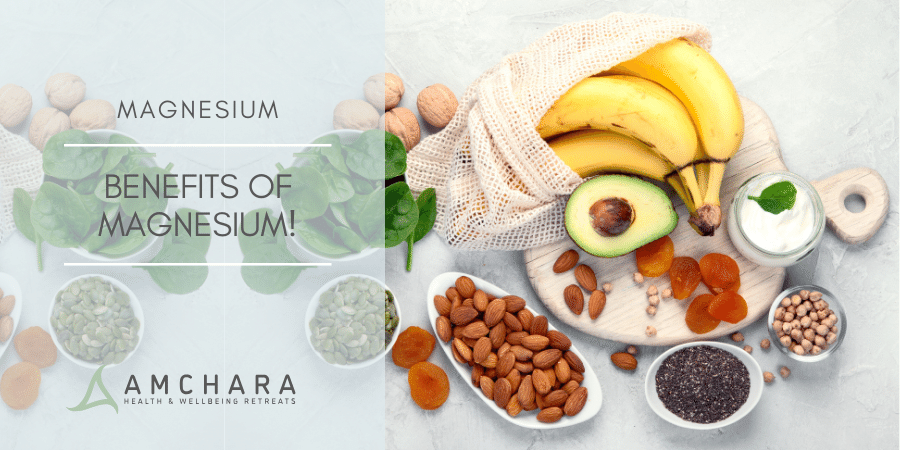Do you eat at least a full bag of leafy greens per day? Do you drink alcohol? Do you suffer from stress daily? Well, you might be glad to learn that getting more magnesium can help with all these things.
Magnesium is one of the top minerals that is essential for you to stay healthy. According to our naturopath, Rhaya Jordan, if there was only one mineral that she could tell you to get most, it would be magnesium because there are so many health benefits associated with magnesium.
Magnesium is one of the essential minerals to help with your health, and it’s needed for more than 300 chemical reactions in the human body.
What benefits does magnesium offer?
Magnesium is needed for regulating your body temperature, transmitting nerve impulses through the body, detoxing, producing energy, protein synthesis, bronchospasm relief and keeping your teeth and bones in good nick. It also helps to absorb calcium, another important mineral, and helps with muscle function. Other great benefits include assisting with problems such as constipation, insomnia, migraines and kidney stones, and a reduction in the risk of cardiovascular diseases such as heart disease, heart attack, stroke and heart rhythm disorders.
Health experts are always stressing how imperative it is to get the recommended amounts of vitamins and minerals into the body, with magnesium being high up in the list.
Magnesium for women
Women in particular benefit from getting enough magnesium in the body. It helps to reduce the risk of osteoporosis for one, and many studies have shown results that when magnesium and calcium are taken simultaneously, bone mineral density is increased.
Magnesium can also help to relieve menopause and premenstrual syndrome (PMS) as well as reducing the risk of early labour in pregnancy. The reason that magnesium helps with PMS is that it helps with the excretion of hormones. Figures as high as 7 out 10 suggest women do not get enough magnesium in their diets.
Magnesium and diabetes
Another fascinating benefit of magnesium according to a range of studies is that people who have a magnesium deficiency appear to have a higher risk of developing diabetes type 2. Magnesium deficient people with diabetes also have a higher risk of experiencing diabetic retinopathy, a condition whereby damage to the retina in the eye occurs caused by complications in diabetes, which can lead to the patient losing vision in one or both eyes. Taking magnesium supplements can therefore reduce the risk of developing type 2 diabetes and developing diabetic retinopathy.
How do I get the magnesium that I need?
Food is always a good place to start to get the essential vitamins and minerals that you need in the body. Good sources of magnesium include foods such as nuts, grains, green leafy vegetables and fish. Many salad foods like celery, cucumber and bell peppers are also a good source of magnesium. Magnesium is in the centre of the chlorophyll molecule. Anything green will contain magnesium, so make sure you get your greens every day for a magnesium boost.
Of course, as with most essential vitamins and minerals, it can be difficult to get the recommended amounts from food alone and so it never harms to take a daily supplement that includes the recommended amount of magnesium.
Amchara Retreats
If you’d like to find out more about our detox retreats, please see our retreats page. When you come to us for a detox retreat, you can meet with Rhaya Jordan, our naturopath, as well as other natural and medical experts including raw foods experts, general practitioners, medical healthcare professionals, yoga and healing experts, nutritional therapists and experts in massage, aromatherapy and acupuncture. Get in touch today if you’d like to find out more about our retreats.




